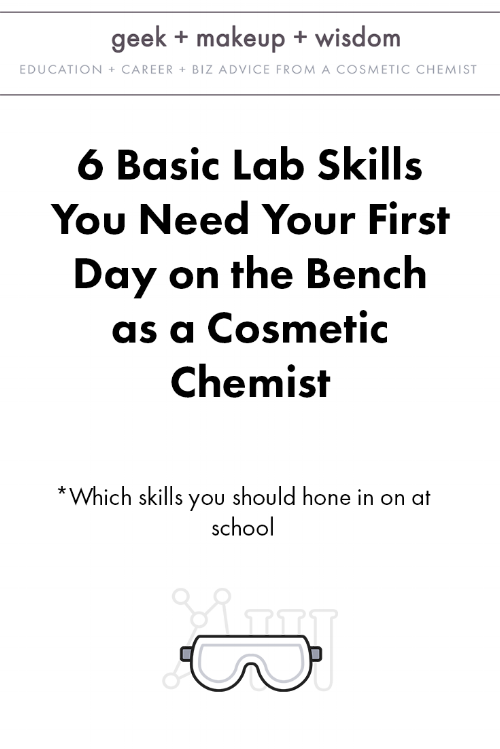Many students are surprised when a cosmetic chemist tells them that working on the bench is basically like cooking. You have to accurately measure each ingredient, mix things at the right speed, heat it or cool it to the right temperature, etc.
Due to the lack of cosmetic chemistry educational opportunities, many students enter the cosmetic chemistry field with no prior experience in the actual industry.
Never fear! The skills you've learned in school DO apply, and can help you succeed your first day on the bench:
1. Taking good lab notes
I know that filling out your lab notebook for class can be a pain and feel pretty mundane. They make you follow very strict formats (ie Objective, Hypothesis, Experimental Design, Discussion, Results), but do not take this for granted! Taking accurate and succinct notes of your experiments is a very important skill. In my experience, I feel that most students don’t take it seriously since they don’t see the application of it. But in reality, your laboratory notebook (whether physical or digital) must be easy to follow so you can go back and see your progress on previous formulations. Taking good notes is also important for GLP (good laboratory practices) and GMP practices (good manufacturing practices).
2. Using a weight scale
I want to drive the point home how imperative it is to be accurate in your lab measurements when you’re making a formula. Inaccurate measurements can have an impact on your formula structure, its stability and its aesthetic. Being as accurate as possible with your measurements can also reduce factors in assessing how to recalibrate a formula. If you accidentally add too much oil, of course the product is going to be greasy.
3. Understanding the EXPERIMENT
How many times do you go through an experiment absentmindedly without actually trying to understand what the f*** you are doing? Ha, yeah. I've been there. But you cannot work like this in the cosmetic chemistry lab. While you may have a mentor, this is the real world where the TA or tutor can't walk you through every step. You are making real products for real clients, whether it be your company's accounts or for your own company. Either way, you need to understand every step of what you're doing, why you're doing it, and what the function is of each ingredient, whether it be related to stability, aesthetics or both.
Don't worry when you first start out if you are lost. All cosmetic chemists have been there, especially in the past when the internet didn't exist and resources for learning about cosmetic chemistry was not so easy to acquire. If you don't understand what you did in the lab, ask your supervisor. Look it up. Join a forum and engage in conversation. Ask a scientist on Twitter.
Take my cosmetic chemistry course ;) (Eyyyyyyy, shameless plug in!)
But seriously. Learn what the f*** you are doing.
4. Lab safety and etiquette
Learn to follow safety protocols, including wearing your lab coat, gloves, hair net and goggles. When the FDA decides to audit your lab and you’re not already in the proper gear, I’m sure they (and your boss) won’t be very happy with you.
This should also go without saying, but when disposing chemicals also be mindful of what you’re mixing. (Will this acid/base reaction be extremely exothermic? Hm…)
5. Lab cleanliness
This ties in with lab safety and etiquette—if you tend to not take care of your glassware or instruments in your lab class, it's best to start good habits now. While students may be lazy in their academic classes since they feel that the repercussions for being lazy are low, the reality of working in a cosmetic chemistry lab is that you need to keep your work area neat. Nothing is worse than doing an experimental design with dirty labware, only to find that you've contaminated your product. Inaccuracy can give you the wrong pH or odor, or even lead to instability or shitty aesthetic.
Make your life easier. Avoid the hassle. Don't half-ass it. Clean up after yo' damn self.
6. CHEMICAL DISPOSAL
Again, this ties in with safety, but it's important to understand which containers you can dispose chemicals into and the proper way to dispose them. Sometimes in the cosmetic chemistry lab, you can throw non-hazardous things like lip gloss into the trash. Other chemicals such as acids and bases (ex: sodium hydroxide and glycolic acid) should be disposed in a hazardous waste bottle. A lab manager will dispose of this container once it's full.
Sound off in the comments what you think is your strongest skill and what is your weakest skill. Let me know if you want some advice on honing in on your skills!

